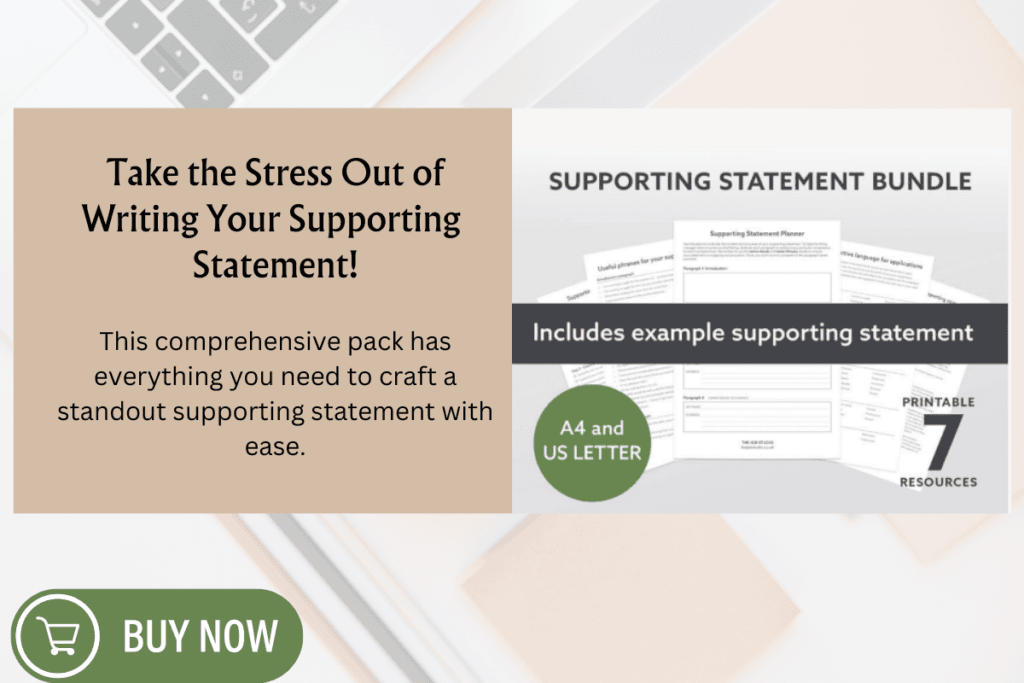Introduction
Your supporting statement is the key to standing out in your NHS job application. Therefore is critical you understand how to write a supporting statement.
Whether you’re aiming for a nursing position, healthcare assistant (HCA) role, or any other NHS post, this is your chance to showcase why you’re the perfect fit.
A strong, tailored statement can make all the difference in securing that job.
Ready to craft a statement that turns heads? Our Supporting Statement Bundle is packed with expert tips, strategies, and ready examples to help you shine.
Click below to access this must-have resource and start building your standout application today!
What You’ll Gain from This Post:
- Understand the purpose of a supporting statement.
- Learn how to align your skills with the person specification and job description.
- Tips for using impactful adjectives to make your statement stand out.
- Insights into the NHS’s filtering process and how to avoid application rejection.
- A clear structure for your supporting statement.
“Getting an interview slot isn’t luck. It’s about how well you craft your application.”
How to Write a Supporting Statement for an NHS Job
1. Start with Research
Before crafting your supporting statement, take the time to carefully review the job description and person specification.
Identify key keywords, essential skills, and qualifications that are critical for the role. By understanding exactly what the employer is seeking, you can tailor your statement to align with their needs.
For clear guidance and examples, explore our Supporting Statement Bundle, designed to help you create a compelling and targeted application.
Pro Tip: Copy the job description and person specification into a separate document for easy reference while writing.
2. Structure Your Statement
A strong supporting statement should be well-structured and easy to read. Use the following format:
Introduction
Start by stating the role you’re applying for and why you’re the best fit. Use powerful adjectives and a confident tone.
Example:
“I am applying for the Band 5 Nursing role in your trust. With over three years of clinical experience and a passion for delivering exceptional patient care, I believe I am an ideal candidate for this position.”

Body
Use the body to detail your qualifications, skills, and achievements. Align them with the job requirements:
- Skills and Experience: Include scenarios demonstrating your skills, such as managing an angry patient calmly or identifying an obstetric emergency.
- Qualifications: Mention relevant certifications or courses like NVQ Level 3 or infection control.
Conclusion
Summarize your suitability and enthusiasm for the role. End with a confident statement.
Example:
“I look forward to the opportunity to contribute to your trust and provide compassionate, high-quality care to patients.”
3. Use Impactful Adjectives
Words like “enthusiastic,” “compassionate,” and “adaptable” add depth to your statement. Borrow adjectives from the job posting to mirror the employer’s language. Explore impact phrases and words in our supporting statement bundle.
4. Address Key NHS Values
The NHS values teamwork, compassion, and patient-centered care. Highlight how you embody these values:
Example:
“I consistently uphold the NHS’s commitment to delivering patient-centered care by actively listening to patients and tailoring treatment plans to their needs.”
5. Proofread and Save Your Statement
Typos or grammatical errors can ruin a great application. Write your statement in a Word document and save it for future applications. Proofread with Grammarly.
Adapt it for different roles but avoid rewriting it completely each time. For example, here’s a sample supporting statement you can use as inspiration:
Example Supporting Statement:
“I am applying for the Band 3 Healthcare Assistant role in your trust. With two years of experience in providing compassionate and patient-focused care, I believe I am well-suited to join your team. In my previous role, I consistently ensured high-quality care by effectively communicating with patients and collaborating with multidisciplinary teams.
One notable achievement includes managing a challenging patient who was initially resistant to care. Through active listening and patience, I gained their trust and successfully supported their recovery. This experience reinforced my ability to stay calm under pressure and adapt to varying needs.
I am certified in NVQ Level 3 in Health and Social Care and have completed additional training in infection control and safeguarding. These qualifications, combined with my practical experience, enable me to deliver care that aligns with NHS standards and values. I look forward to contributing to your trust’s mission of delivering exceptional patient care.”
Get full version examples here.
Frequently Asked Questions (FAQs)
What Should I Write in a Supporting Statement?
Your supporting statement should include:
- Why you’re interested in the role.
- Your relevant skills and experience.
- How you meet the job’s person specification.
- Examples demonstrating your abilities.
How Do I Start an NHS Supporting Statement?
Start with a strong introduction that captures your enthusiasm and clearly states the role you’re applying for.
What Makes a Good Supporting Statement?
A strong supporting statement can set you apart from other applicants and bring your CV to life. To maximize its impact, ensure your statement is:
- Tailored to the Job Description: Take the time to analyze the job description and person specification. Identify key skills, qualifications, and competencies required, and align your experiences to these. A personalized approach demonstrates your genuine interest and ensures you’re addressing the employer’s needs directly.
- Confident and Professional in Tone: Use positive and assertive language to convey your abilities and achievements. Showcase your expertise while maintaining a humble and professional tone, leaving no doubt that you’re the right fit for the role.
- Clear, Concise, and Error-Free: Recruiters often skim applications, so it’s vital that your statement is easy to read and gets straight to the point. Avoid jargon, double-check for typos, and make sure every sentence adds value to your application.
Crafting such a statement may feel overwhelming, but it doesn’t have to be. Our downloadable Supporting Statement Bundle takes the guesswork out of the process. Packed with expert guidance, detailed examples, and tools to plan, structure, and write your statement, this resource ensures your application stands out for all the right reasons. Click now to access the bundle and give your NHS application the winning edge!

Do I Need to Rewrite My Supporting Statement for Each Job?
Not entirely. Save a base template and adjust it to align with the specific job’s requirements.
How Do NHS Applications Get Filtered?
Applications that don’t meet essential criteria (e.g., “appropriate registration”) are filtered out by the system before reaching the recruiter.
With this guide, you’re well on your way to crafting a standout supporting statement. Take the first step towards securing your dream NHS role—start writing today!
Tips for Writing Supporting Statements
Tailor Your Statement to Specific Roles
Each NHS job has unique requirements. For example:
- For Nursing Roles: Emphasize clinical skills, experience with patient care, and knowledge of NHS protocols.
- For Healthcare Assistant Roles: Highlight compassionate care, communication skills, and adaptability.
Use Quantifiable Achievements
Adding numbers and outcomes to your accomplishments makes them more impactful:
- “Provided care to 15+ patients daily, maintaining a 98% satisfaction score.”
- “Trained 5 new staff members in infection control protocols, reducing incidents by 20%.”
Emphasize Your Commitment to Continued Learning
Mention courses, certifications, or training programs you’ve completed or are pursuing:
- “Currently enrolled in NVQ Level 4 to further enhance my care delivery skills.”
- “Completed advanced CPR training to better respond to emergencies.”
Showcase Your Understanding of NHS Challenges
Demonstrating awareness of NHS challenges (e.g., staff shortages, high patient demand) shows your readiness to adapt and contribute:
- “I’m aware of the challenges in delivering quality care during peak times and have successfully managed similar situations by prioritizing tasks efficiently.”
Focus on Soft Skills
Soft skills like empathy, teamwork, and problem-solving are crucial in NHS roles:
- “Collaborated with a multidisciplinary team to develop individualized care plans, ensuring holistic patient support.”
- “Resolved patient grievances by actively listening and addressing concerns promptly.”
Your Journey to NHS Success Starts Here
Crafting a standout supporting statement takes effort, but it’s your ticket to securing an NHS interview. With research, structure, and personalization, you can create a statement that truly reflects your potential. Start applying these tips today and step closer to your dream NHS job.

It’s Time
Share this post with anyone who might benefit from it and help them secure their NHS dream role too!
If you found this guide helpful, don’t forget to like and comment below with your thoughts or questions.
Download our Supporting Statement Bundle to jump start your application process.
Related Blog Posts in This Series
This blog post is one of a series to help you craft the perfect supporting statement. Check out other posts in this series:
How to Write an NHS Supporting Statement (2025)




